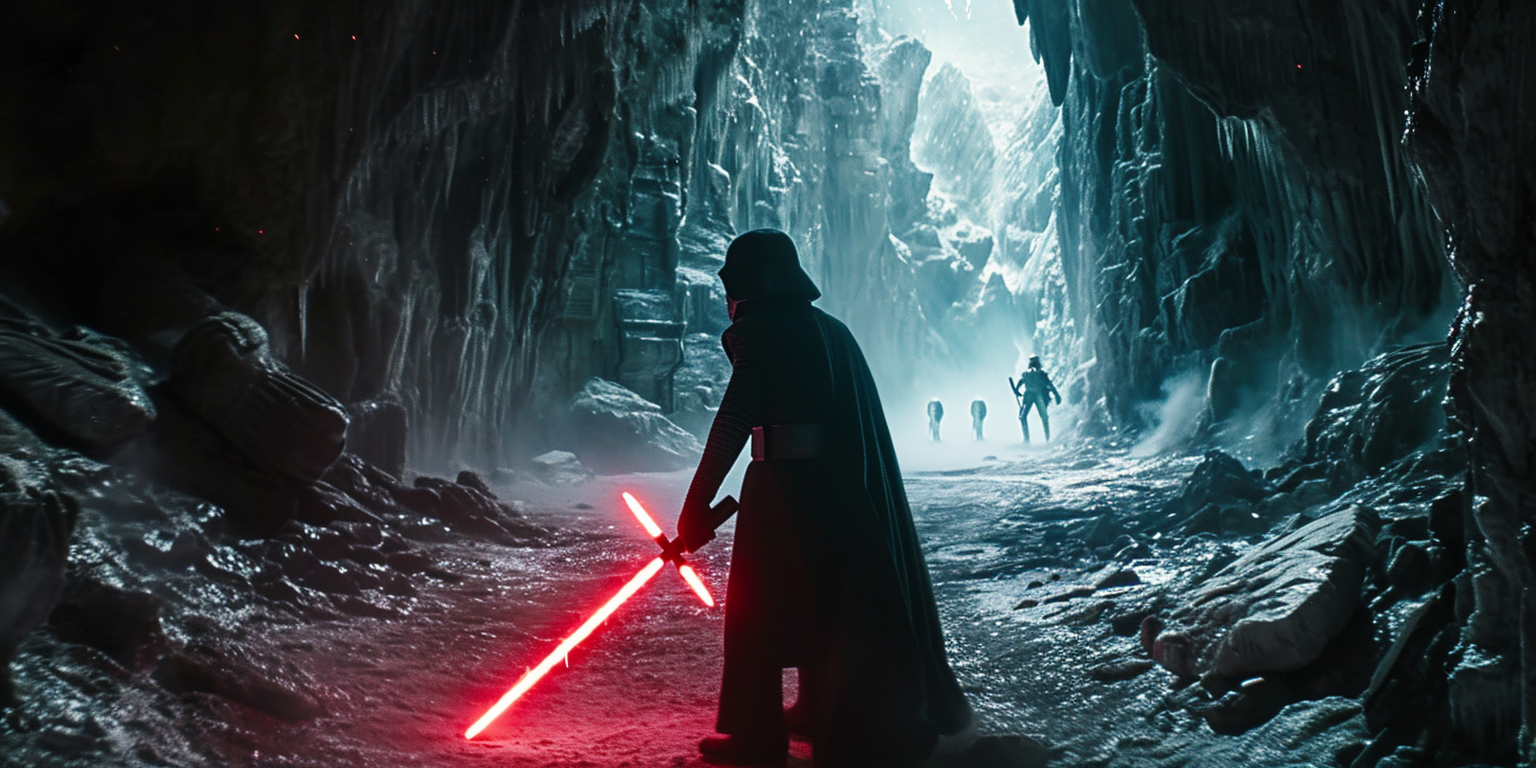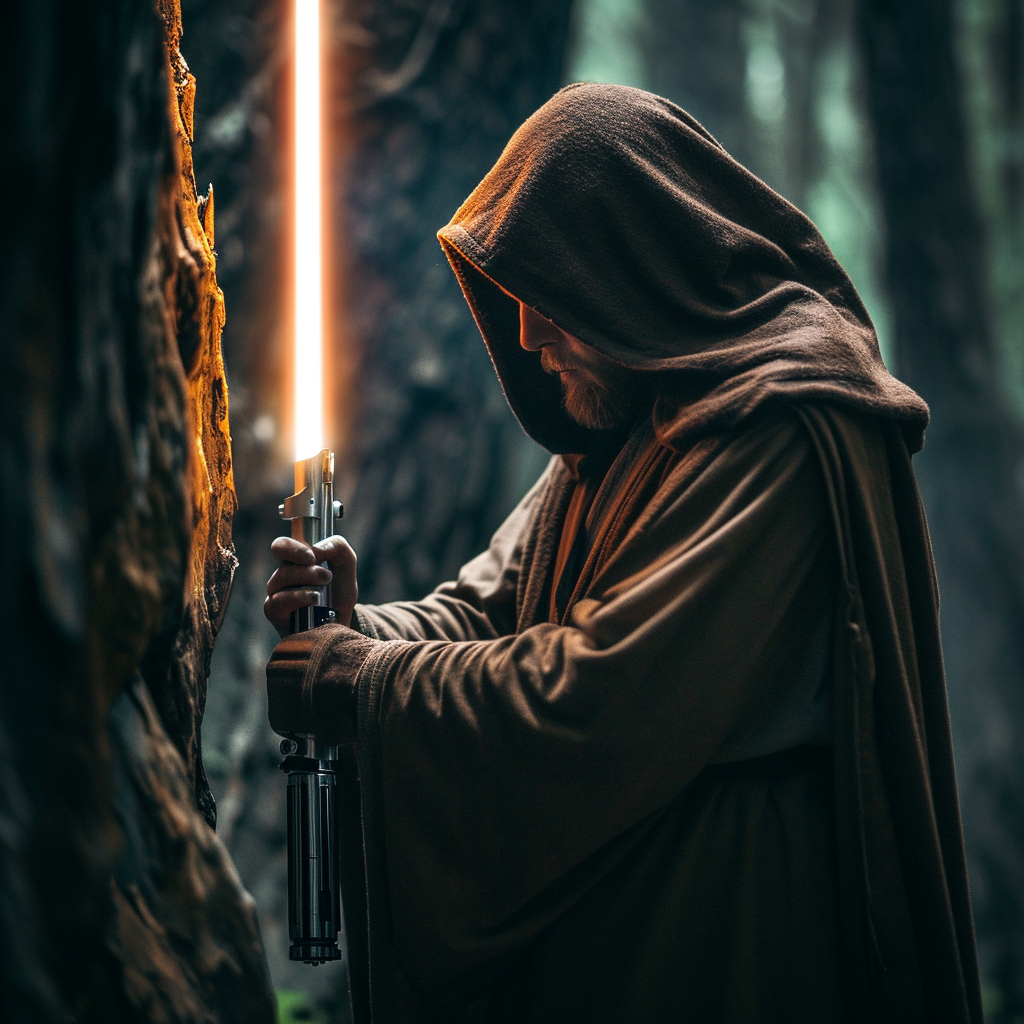
Star Wars Sound Effects: Light Sabers, Laser Blasters & More
The iconic sound effects heard in Star Wars films were first realized in and evolved over decades to become an instantly recognizable sonic brand. From the humming of lightsaber sounds to the unique beeps of each droid, the franchise elevates machines and turns them into characters with stories.
In this article, we’ll delve into the rich tapestry of sci-fi sfx, beginning with sound designer Ben Burtt’s early work in A New Hope and Empire Strikes Back. Each section has time stamped videos so you can listen while your read about them. We made sure to include examples from some of the newer films and animations as well.
Need effects that sound like they’re from Star Wars, but aren’t? We rounded up 20 royalty-free Star Wars-inspired sound effects straight from the Audio Design Desk collection. Click the download button in the audio player below to access a sound pack of hi-res wav files.
Need more sounds to choose from? We offer an expansive collection at Audio Design Desk, with over 70,000 audio files with including all the essential effects for a modern, science fiction space drama. Sign up for free today and check it out!
Jedi Warfare: Light Saber and Blaster Sounds
Ben Burtt, the creative genius behind early Star Wars sound effects, invented new techniques to capture the feeling of a lightsaber and laser blaster. These sounds made a big impact during their debut and have remained a core part of the Star Wars movie franchise ever since.
Below you’ll find one of the most important scenes in the film’s storyline, from Empire Strikes Back. George Lucas wanted this battle between Luke Skywalker and Darth Vader to take on mythic proportions.
Most of the film’s fight scenes are accompanied by music, but this scene was particularly silent. The clashing of lightsaber sound effects are heard almost exclusively, punctured occasionally by Luke’s falls and grunts as Vader initially overpowers him. A similar preparation was used in the prequel’s Phantom Menace fight scene between Obi-Wan and the Sith character Darth Maul.
Burtt achieved the buzzing and swooshing sound of the lightsabers by recording the hum of idling interlock motors of an old movie projector. He combined this with the feedback generated by passing a stripped microphone cable by a television set.
Hear the story from Burtt himself in the short video interview below:
Laser blaster sounds like the “traitor” scene below from Star Wars VII follow a different formula and required a different sound design technique. When the storm trooper fires his blaster, it uses two tones; one for the initial pressurized shot and a second fly-by tone as that laser flies through the air. This particular example has them separated by the interval of a major third.
The original blaster sound fx were created when Burtt accidentally struck a guy-wire (the tensioned cables that support radio antenna towers) and producer a sharp twang. This sound, once recorded, was manipulated and mixed with other elements to create the blaster’s signature effect.
Star Wars films have since explored a broader sonic pallet. Take for example this single-toned shot fired by Boba Fett in the Mandalorian. It sounds closer to a gun sound effect than a laser, but still retains some of the initial charm.
Millennium Falcon – Starfighters and Space Canons
The Star Wars team scaled up their hand-held laser blasters and mounted them onto spaceships called starfighters. Laser canons are fired at will by the captain and are probably the most common spaceship weapon found in the series.
You can watch and listen to these space cannons in a scene from the Empire Strikes Back. Hans Solo and his Wookiee copilot Chewbacca navigate the Millennium Falcon through an asteroid field, dodging TIE fighters that get struck by rocks and explode. Chewie’s animal-like groans convey the visceral anxiety that everyone onboard is feeling.
The roaring doppler effect of the Millennium Falcon’s engines combines with the whooshing by of space debris. John Williams’ score conveys an intense urgency that, coupled with blaster fire and exploding asteroids, makes for an immersive soundscape that can pull any audience into the action.
The sound design is remarkably consistent over a span of more than 40 years. Compare Ben Burtt’s Millennium Falcon sounds above with what audiences heard in the 2019 film Rise of Skywalker as the ship descended. Not a lot has changed aesthetically!
C-3PO and R2-D2: Droid SFX in Star Wars
Droids in the Star Wars universe, beginning with R2-D2 and C-3PO, were endowed with something close to human consciousness. It’s easier to imagine these robots existing today, between ChatGPT and the Boston Dynamics robots. But back then, it was Burtt’s sound design that brought the personalities of each droid to live and make them so much more believable.
R2-D2 sound effects consisted entirely of beeps and mechanical whirring sounds. With the help of John Williams’ score, Lucas was able to prepare special moments for it to ‘speak’ and define its character without words.
From curious whistles to alarmed chirps, each of R2-D2’s sounds were crafted to portray a sense of emotional depth. He is kind of the “cute puppy” of the group, reacting instinctively to threatening situations with adorable sounds.
C-3PO’s voice, on the other hand, was designed to sound like a human. His anxious and formal tone seems more like a neurotic human than a calculating robot. Voiced by English actor Anthony Daniels, C-3PO’s speech is characterized by a distinctive, precise British accent that one might otherwise associate from a butler.
The sound designers meticulously processed Daniels’ voice to give it a slightly metallic timbre, subtly reinforcing the character’s robotic nature while maintaining the clarity and expressiveness of human speech. This blend of human-like articulation with a mechanical edge makes C-3PO’s voice instantly recognizable and contributes significantly to his personality.
Yoda, Jawa and Sith: Alien Creatures and Wildlife
The “Star Wars” series is rich with alien creatures, each with its unique sound. From the menacing growls of Wookiees to the haunting calls of the Porgs, these sounds add to the diverse alien fauna of the galaxy.
Yoda’s voice, performed by Frank Oz, is distinguished by its unique syntax and tone, reflecting his wisdom and age. The sound design for Yoda focuses on enhancing the natural qualities of Oz’s performance, emphasizing the character’s diminutive stature and ancient wisdom. His speech, with its unusual structure and cadence, is made more poignant by a voice that combines frailty with strength, encapsulating Yoda’s profound spiritual and Jedi mastery.
The Jawas, scavengers of the Tatooine desert, have voices is characterized by their high-pitched, almost squeaky timbre created through electronic processing. Despite their hooded appearance, they exude a sense of playfulness and mischief. These sounds are integral in depicting their role as scavengers, communicating their excitable and secretive behavior without the need for clear dialogue.
Crafting your own Star Wars sound effects
Disclaimer: Audio Design Desk doesn’t sell link placements or place affiliate links in any article. We’ve added callouts with links in this next section, in order to help you find the right tools for the job. We are not partnered with any of these companies.
Applying granular stretching and pitch manipulation to light saber sounds can result in new otherworldly timbres and textures to wield. Using a combination of distortion and delay feedback on a laser blaster is a great way to discover new futuristic weapons. Here’s a detailed guide on how to achieve these effects.
Step-by-Step Instructions:
1. Granular Stretching and Pitch Manipulation for Light Saber Sounds
- Source Sound:
- Start with a high-quality recording of a light saber sound. Ensure it has clean and distinct characteristics.
- Granular Synthesis:
- Plugin Recommendations: Granulator II (Ableton Live), iZotope Iris, or Output’s Portal.
- Load the light saber sound into a granular effect plugin.
- Adjust the grain size and density to create different textures. Smaller grains can produce smoother sounds, while larger grains can create choppy, stuttered effects.
- Experiment with grain position and movement to add dynamic changes to the sound.
- Pitch Manipulation:
- Use the pitch modulation features of the granular synthesizer to shift the pitch up or down. This can create alien and otherworldly tones.
- Automate the pitch over time to add a sense of movement and evolution to the sound.
- Additional Effects:
- Apply additional effects like reverb (Valhalla Shimmer) and delay (Soundtoys EchoBoy) to enhance the spatial and temporal qualities of the sound.
2. Distortion and Delay Feedback for Laser Blaster Sounds
- Source Sound:
- Start with a high-quality recording of a laser blaster sound. Ensure it has distinct transients and a clear sonic profile.
- Distortion:
- Plugin Recommendations: Minimal Audio Rift, Soundtoys Decapitator, or iZotope Trash.
- Insert the distortion plugin on the laser blaster track.
- Adjust the drive or distortion amount to add grit and aggression to the sound. Experiment with different distortion types to find the most suitable character.
- Use the mix knob to blend the distorted signal with the dry signal, maintaining some of the original clarity while adding texture.
- Delay Feedback:
- Plugin Recommendations: Waves H-Delay or Output Thermal.
- Insert the delay plugin after the distortion.
- Set the delay time to a short value (e.g., 50-200 ms) and increase the feedback to create a repeating, decaying effect.
- Experiment with different delay types (e.g., tape, analog) to achieve various textures.
- Modulate the delay parameters, such as feedback and delay time, to add dynamic changes and evolving textures to the sound.
- Combining Effects:
- Use automation to control the distortion and delay parameters, creating dynamic changes throughout the sound.
- Apply EQ to shape the overall tone, cutting unnecessary frequencies and boosting desired ones to enhance the futuristic quality.
Example Workflow in a DAW:
- Import Source Sounds:
- Load the light saber and laser blaster recordings into your DAW.
- Granular Stretching for Light Saber:
- Apply granular synthesis to the light saber sound, adjusting grain size, density, and pitch modulation.
- Add reverb and delay for additional spatial effects.
- Distortion and Delay for Laser Blaster:
- Apply distortion to the laser blaster sound, adjusting drive and character.
- Add delay with high feedback and modulate delay parameters for evolving textures.
- Fine-Tuning and Mixing:
- Use EQ to shape the final sound, ensuring clarity and impact.
- Balance the levels and spatial positioning in the mix to create a cohesive audio experience.
By leveraging granular stretching, pitch manipulation, distortion, and delay feedback, you can transform standard light saber and laser blaster sounds into new, otherworldly timbres and futuristic weapons. These techniques allow for endless experimentation and creativity, resulting in unique and immersive sound design elements for your projects.
Star Wars Soundboards
Fans of the series can further explore all of the great sounds that Star Wars has to offer by visiting one of the popular soundboard pages online. For those not familiar, a soundboard is a repository of sound fx from popular culture hosted online for fans to browse. They’re usually designed with a low brow, underground aesthetic.
Three of the most popular Star Wars soundboards include My Instants, Realm of Darkness, and 101 Soundboards. Here you’ll find wav files from every scene, ranging from character voices and planetary ambience to iconic moments like the explosion of the Death Star.
It’s illegal to use those sounds commercially without a license, which is why we recommend signing up for Audio Design Desk and accessing our 70,000+ royalty free sound fx instead. If you haven’t taken a listen already, scroll back up to the top of this article and check out the audio embed. Maybe you’ll find what you need there and can download the wav pack for free!
